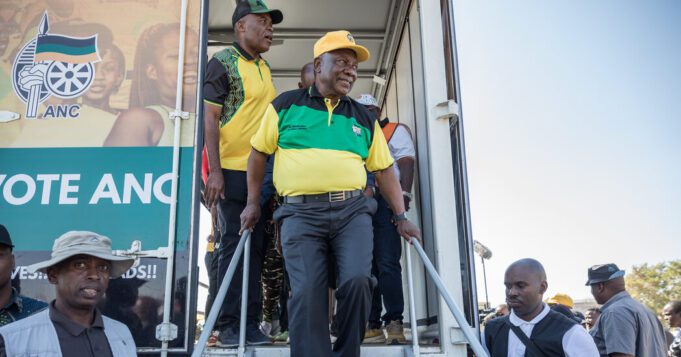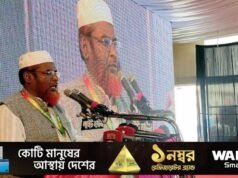Saturday's election results showed the African National Congress had only about 40 percent of the vote after nearly all the ballots were counted, losing its monopoly on South African politics for the first time since it toppled Africa's last white-led regime 30 years ago.
South Africa faces the world's highest unemployment rate, water and power shortages and rampant crime, and the ruling party, while still beating its rivals, is a far cry from the nearly 58% of the vote it won in the last election in 2019.
The shocking setback for Africa’s oldest liberation movement has set one of the continent’s most stable countries and largest economies on a difficult and uncharted path.
The party, which won international acclaim under Nelson Mandela, will now have two weeks to form a government with one or more rival parties that have derided it as corrupt and vowed never to ally with it.
“I was really shocked,” said Maropene Ramokgopa, one of the senior officials of the African National Congress (ANC). “It opened our eyes and said, 'Look, we are missing something somewhere.'”
South African President Cyril Ramaphosa's dream of re-election faces a serious threat as he will be forced to use the negotiating skills that helped him bring about the end of apartheid and unite his faction-ridden party, which is likely to be divided over which party to ally with.
Critics are expected to blame Mr Ramaphosa for the disastrous fall and may try to replace him with his deputy, Paul Mashatier. The party's previous biggest drop in an election was 4.7 per cent in 2019.
“I didn’t expect Ramaphosa to make things worse than he found them in five years,” said Khulu Mbatha, a senior ANC figure who has been critical of the party’s lack of anti-corruption efforts.
Without an absolute majority, the ANC can no longer choose the country's president, who is elected by the 400 members of the National Assembly. There are 52 political parties participating in the national election, and the number of seats each party receives in parliament depends on the percentage of votes it wins.
“South Africa will go through some teething problems as it enters this era,” said Pranish Desai, a data analyst at the nonpartisan group Good Governance Africa. “Some of these issues may be important, but voters decided they wanted this.”
Political analysts say that because the gap to reach 50 percent support is huge, the ANC cannot just pull in the smaller parties that would have allowed it to maintain its dominant position in the government. Instead, the ANC must rely on some of the larger parties that it fiercely fought with during the campaign.
The dilemma has upended South Africa's political landscape and put the ANC at a turning point. Its potential coalition partners span a wide range of ideologies, and the party could alienate different parts of its supporters depending on who it chooses to ally with. That could potentially split the party.
A big question is whether the A.N.C. will accept or reject a new party led by Jacob Zuma, Ramaphosa's sworn enemy and former president and A.N.C. leader.
Zuma was forced to resign in 2018 amid a corruption scandal. Feeling betrayed by his party and former deputy Ramaphosa, he helped form a new party, Khmer Rouge (MK), the name of the ANC’s armed wing during its fight against apartheid. Zuma was barred from running for a parliamentary seat, but Khmer Rouge won nearly 15% of the vote, an unprecedented result for a new party in a national election. The party took crucial votes away from the ANC and other parties.
“Of course, it did surprise the ANC,” Nomvula Mokonyane, one of the ANC's top officials, said of MK's performance. “It was beyond our expectations.”
No one has ruled out Mr Zuma reuniting with his former friend, now enemy – although it would be humiliating for the ANC and the ruling party's leaders are likely to resist one of Mr Zuma's fundamental demands for a coalition deal. Duduzile Zuma, the former president's daughter, said her father's party would not work with “Ramaphosa's ANC”.
Another potential ally of the ANC is the Democratic Alliance, which came in second with nearly 22% of the vote. Some ANC members accuse the Democratic Alliance of pursuing policies that would effectively return the country to apartheid. Others see a partnership between the two parties as a natural fit because the Democratic Alliance's market-oriented views on the economy align closely with those of Mr Ramaphosa.
But joining the grand coalition could be politically risky for Ramaphosa because the DA has been adamantly opposed to racial policies aimed at boosting black employment and wealth. It has also pushed issues that appeal to right-wing whites.
The ANC could instead seek support from the Economic Freedom Fighters, which was founded a decade ago by Julius Malema, one of the ANC’s expelled youth leaders. Malema’s party failed to live up to expectations, winning less than 10% of the vote, compared with nearly 11% in the last election.
“We want to work with the ANC,” Malema told a news conference on Saturday, speaking uncharacteristically softly, adding that it would be easier to work with the ANC now that the ruling party had slipped badly in the election. “The ANC is not arrogant when it is compromised.”
Malema said Ramaphosa “is not someone we like”, but if he continues to serve as president, it will not affect the two parties to form an alliance.
Analysts say the partnership could spook big business and international investors as the economic freedom fighters insist on nationalizing mines and other businesses and redistributing land seized from white owners to black South Africans.
But such an alliance is attractive to some ANC members because Malema is one of them and a large part of the party's membership is ideologically aligned with the Economic Freedom Fighters' ideas of wealth redistribution.
There are fears the country is headed for political chaos that would divert attention from its many problems. Local coalition governments have proven unstable, with leaders changing at will and infighting so intense that lawmakers are unable to do anything for their constituents.
For many South Africans, their long-standing suffering has led them to question whether they Really got rid of apartheidthis unprecedented moment represents an opportunity for a reset as significant as the democratic transformation of the previous generation.
During the election, the slogan “2024 is our 1994” circulated on social media and campaign posters, especially among young South Africans.
The landmark election ended the dominance of the SWAPO, a party that had led the fight against colonialism and reshaped Africa in the second half of the 20th century. South Africa’s apartheid government banned the SWAPO, sending many of its leaders into exile around the world. Stories of torture and suffering endured by these party members made many of them heroes in the eyes of South Africa and the world — a reputation that has kept many voters who grew up under apartheid forever loyal to the SWAPO.
That loyalty waned, however, as decades of ANC leadership left many South Africans without significant improvements in material conditions, while many of the party’s leaders amassed vast fortunes. Young South Africans Minorities who do not live under white rule have become a growing segment of the electorate, more interested in how a party performs in government than in its image.
The results of the provincial legislative elections provided the most striking demonstration of the ANC’s decline.
In Zuma's home province of KwaZulu-Natal, the ruling party's support soared to 17% from 54% in 2019. In Mpumalanga, one of the ANC's strongholds, the party's support fell by nearly 20 percentage points to 51%, while in Gauteng, the most populous province where Johannesburg is located, the party lost its 50% majority to 35%.
Some of South Africa's neighbours are ruled by former liberation movements that are close allies of the ANC and are also seeing falling electoral support. Analysts say the outcome of South Africa's election could foreshadow the fall of other liberation parties.
Veteran ANC member Mavuso Msimang said he could sense the party's demise as he drove past long lines outside polling stations on election day and feared the party would be punished for failing to provide basic services such as electricity.
“I said to myself, ‘You know, these people aren’t lining up to vote to thank the ANC for taking away the lights,’ ” he said. “It’s clear these people aren’t going to vote for us.”









